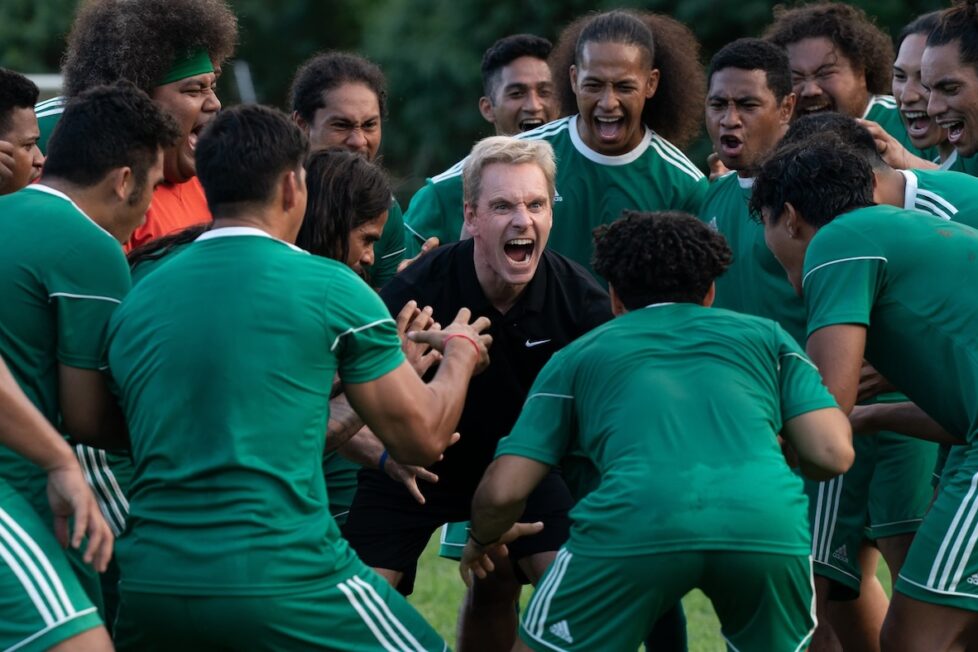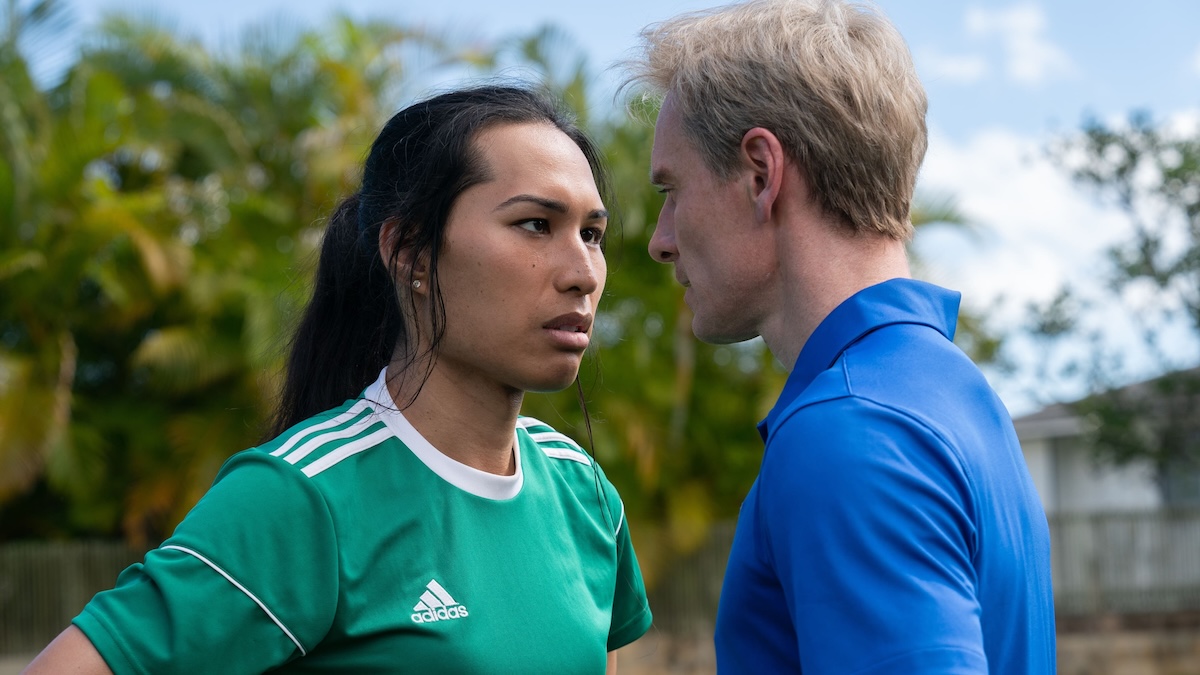NEXT GOAL WINS (2023)
The story of the infamously terrible American Samoa football team, known for a brutal 2001 FIFA match they lost 31-0.

The story of the infamously terrible American Samoa football team, known for a brutal 2001 FIFA match they lost 31-0.


Riding high on the success of one of Marvel Studios’ best films, Thor: Ragnarok (2017), and an Academy Award for Jojo Rabbit (2019), New Zealand filmmaker Taika Waititi was on a hot streak, establishing himself as one of Hollywood’s most sought-after directors. However, following mixed reviews for his sequel, Thor: Love and Thunder (2022), Waititi attempts to reclaim his wunderkind status with the quirky sports comedy Next Goal Wins. Unfortunately, his latest offering fails to score.
Based on the 2014 documentary of the same name, Next Goal Wins follows disgraced football coach Thomas Rongen (Michael Fassbender) as he’s given an ultimatum: unemployment or coaching the American Samoa international team, infamous for suffering the worst international defeat in history to Australia, a staggering 31-0 loss. Reluctantly, Thomas accepts the challenge and finds himself on a small island of just 45,000 people. Upon landing, he’s greeted by the host of the island’s most popular TV show, Who’s on the Plane?, filmed by Tavita (Oscar Kightley), president of the island’s soccer federation, who repeatedly asks of Rongen, “Just one goal”—comically setting the smallest stakes in sports movie history!

The film bears all the hallmarks of Taika Waititi’s acclaimed works, such as Hunt for the Wilderpeople (2016) and Boy (2010): endearing misfits, broken families, a celebration of music, and Waititi’s signature cameos. Next Goal Wins kicks off with Waititi, clad in priestly garb, breaking the fourth wall to describe the religious and communal ethos of American Samoa, the team’s crushing 2001 defeat, and the creative license the film would employ. However, the liberties taken in terms of the plot and action on the pitch seem to have only hurt it.
In 2011, the year in which the film is set, Rongen takes charge of the lowest-ranked international team in FIFA’s world rankings, riding a wave of 38 consecutive defeats. He shows up to the first practice drunk and lounging on a lawn chair, introduced to a team he holds no particular regard for, including Jaiyah (Kaimana), a transgender woman and one of the team’s most talented players, who shows up late.
Following a four-year acting hiatus, Michael Fassbender is making a strong comeback with the release of this film and David Fincher’s The Killer (2023). Though he plays a hitman in the latter, he may be just as unlikeable in Next Goal Wins.

Despite being the straight-laced protagonist amidst a comedic ensemble, Fassbender does bring moments of whimsy and camaraderie to his role as Thomas. However, the script’s lack of emotional development and character growth hinders his portrayal. For the first half of the film, Thomas is portrayed as an aggressively hostile transphobe, which limits the audience’s ability to connect with him. His saving grace is the third act, where he is given more opportunities to showcase his character’s likeability, providing an emotional halftime speech in the vein of Any Given Sunday (1999), which he’s seen watching in the hotel before the World Cup qualifier.
While the film’s spotlight falls predominantly on Thomas and his struggles following the loss of his job and his wife, Gail (Elisabeth Moss), to the U.S Soccer Federation President, Alex Magnussen (Will Arnett), the supporting cast gets little time to shine. The film’s true standout is Kaimana as Jaiyah, the first openly transgender footballer to grace a World Cup qualifying match. Jaiyah’s journey of acceptance within her community while facing relentless harassment from the outside world is easily the most memorable part of the movie.

Overall, Next Goal Wins is a stirring depiction of American Samoa’s culture, portrayed through a respectful and community-oriented lens, rather than through the mocking gaze of an outsider. This approach fosters a connection with the team, even though we don’t gain a deeper understanding of the one-dimensional players beyond their on-field roles.
When we get to the games, it’s another disappointing entry into the canon of football (soccer) films from Hollywood. Despite notable predecessors like Bend it Like Beckham (2002), Goal: The Dream Begins (2005), and even the recent TV comedy Ted Lasso (2020-23), no filmmaker has managed to translate the electrifying energy of the sport to the screen. Not even the pairing of football legend Pelé and Hollywood icon Sylvester Stallone in Escape to Victory (1981) could break this curse, which Next Goal Wins falls prey to.

On the screen, the pitch appears small, the movements sluggish, and teamwork absent. Given American Samoa’s position as the world’s worst team, the film could have delved deeper into the realm of absurdity to narrate their story, and there are fleeting glimpses of that approach. However, the filmmakers seem caught between producing an accurate retelling and a quirky sports comedy, never achieving the ideal balance. The triumphant game’s closing moments are narrated by the players themselves, fulfilling an emotional tradition of passing stories down through generations, but it also suggests a lack of faith in modern audiences to grasp the game through action. This could be more pardonable if the comedy elicited more uproarious laughter than mild chuckles. At times, it strains too hard to be funny.
While Next Goal Wins bears the hallmarks of a feel-good movie, adhering to the familiar tropes of the underdog sports narrative, its lack of exceptional comedy and inadequate portrayal of the game hinder its potential to become a sports classic, scarcely justifying repeat viewings. It leaves us yearning for a genuine return to Waititi’s comedic artistry and a truly great football film.
UK USA | 2023 | 103 MINUTES | 2.00:1 | COLOUR | ENGLISH


director: Taika Waititi.
writers: Taika Waititi & Iain Morris (based on the documentary by Mike Brett & Steve Jamison).
starring: Michael Fassbender, Oscar Knightley, Kaimana, David Fane, Rachel House, Beulah Koale, Will Arnett & Elisabeth Moss.
